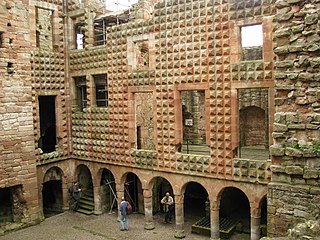John Bothwell may refer to:
- John Bothwell (bishop), Canadian Anglican bishop and author
- John Bothwell (trade unionist), British trade union leader.
- John Bothwell, Lord Holyroodhouse, 16th-century Scottish judge
John Bothwell may refer to:

James Hepburn, 1st Duke of Orkney and 4th Earl of Bothwell, better known simply as Lord Bothwell, was a prominent Scottish nobleman. He was known for his association with, abduction of, and marriage to Mary, Queen of Scots, as her third and final husband. He was accused of the murder of Mary's second husband, Henry Stuart, Lord Darnley, a charge of which he was acquitted. His marriage to Mary was controversial and divided the country; when he fled the growing rebellion to Norway he was arrested and lived the rest of his life imprisoned in Denmark.
Patrick Hepburn, 1st Earl of Bothwell was Lord High Admiral of Scotland. He rose to political prominence after supporting James IV against his father, and was proxy at the King's marriage.
Bothwell is a town in Scotland.

The Guardians of Scotland were regents who governed the Kingdom of Scotland from 1286 until 1292 and from 1296 until 1306. During the many years of minority in Scotland's subsequent history, there were many guardians of Scotland and the post was a significant constitutional feature in the course of development for politics in the country.
Alexander Gordon was a 16th-century Scottish churchman who was successively archbishop of Glasgow, titular archbishop of Athens, bishop of the Isles and bishop of Galloway.
Jean Gordon may refer to:
The Abbot of Holyrood was the head of the Augustinian monastic community of Holyrood Abbey, now in Edinburgh. The long history of the abbey came to a formal end in July 1606 when the parliament of Scotland turned the abbey into a secular lordship for the last commendator, John Bothwell. The following is a list of abbots and commendators:
Timothy John Bothwell is a retired professional ice hockey defenseman who played 502 games in the National Hockey League. He played for the New York Rangers, St. Louis Blues, and Hartford Whalers, and several AHL teams. Before his professional career, he played at Brown, where he was a three-time all-Ivy League defenseman, member of the Bruins' 1975-76 NCAA semi-finalists, and captain of the team the next two seasons. Tim was inducted into the Brown University Athletic Hall of Fame in 1984. He retired from playing hockey in 1990.
James Hepburn may refer to:
The Battle of Carberry Hill took place on 15 June 1567, near Musselburgh, East Lothian, a few miles east of Edinburgh, Scotland. A number of Scottish lords objected to the rule of Mary, Queen of Scots, after she had married the Earl of Bothwell, who was widely believed to have murdered her previous husband Lord Darnley. The Lords were intent to avenge Darnley's death. However, Bothwell escaped from the stand-off at Carberry while Queen Mary surrendered. Mary abdicated, escaped from prison, and was defeated at the battle of Langside. She went to exile in England while her supporters continued a civil war in Scotland.

Francis Stewart, 5th Earl of Bothwell was Commendator of Kelso Abbey and Coldingham Priory, a Privy Counsellor and Lord High Admiral of Scotland. He was a notorious conspirator, who led several uprisings against King James VI and died in poverty, in Italy, after being banished from Scotland. Francis was the first cousin of King James VI of Scotland. Francis's maternal uncle James Hepburn, 4th Earl of Bothwell was the chief suspect in the murder of James VI's father Henry Stuart, Lord Darnley.

The Ainslie Tavern Bond was a document signed on about 20 April 1567 by a number of Scottish bishops and nobles. The bond approved the Earl of Bothwell's acquittal on 12 April of implication in the murder of Lord Darnley, recommended him as an appropriate husband for Mary, Queen of Scots, and pledged to assist in defending such a marriage.

John Hepburn was provided bishop of Brechin, Scotland, by Pope Leo X on 29 October 1516, but there may have been a delay in consecrating him due to his "defect of age". He may not have been consecrated until sometime between June 1522 and 23 February 1523, though the evidence is complex and contradictory.
John Charles Bothwell was a Canadian Anglican bishop and author in the second half of the 20th century.
Adam Bothwell, Lord of Session, was Scottish clergyman, judge and politician. He served as Bishop of Orkney (1559), Commendator of Holyrood House (1570), Extraordinary Lord of Session (1563–4), Ordinary Lord of Session (1565) and Member of Privy Council.
Francis Bothwell of Edinburgh, Lord of Session, was a Scottish merchant, landowner, judge and politician. As a university graduate, he was called Master Francis Bothwell, or "Dominus" in Latin documents; however, this has been misunderstood by some writers, so he is occasionally, inaccurately, referred to as "Sir" Francis Bothwell.
Events from the year 1593 in the Kingdom of Scotland.
Events from the year 1578 in the Kingdom of Scotland.
Bothwell is a Scottish surname. Notable people with the surname include:
John Bothwell, Lord Holyroodhouse (c.1550–1609) was a 16th-century Scottish judge and Senator of the College of Justice residing at Holyrood House prior to it becoming a royal palace.